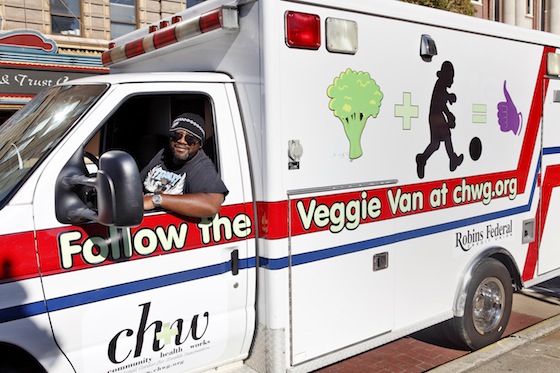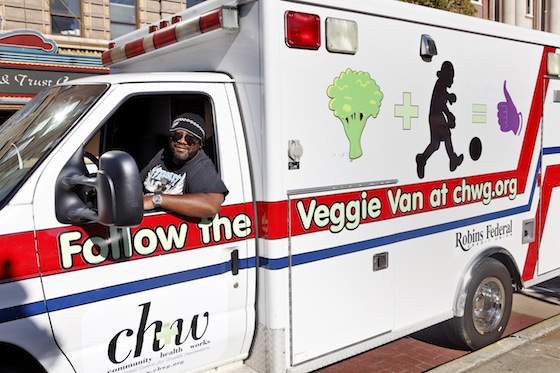
Twice a week, a retrofitted ambulance heads out into Macon neighborhoods.
Instead of bringing emergency medical care, though, the recently launched Veggie Van carries fresh fruits and vegetables. And the intended customers for this nutritious fare are residents of areas known as “food deserts.’’
These areas lack access to affordable fruits, vegetables and other foods that make up a healthy diet. In food deserts, the neighborhood stores don’t sell fresh produce, and many residents lack transportation to reach a grocery or farmers’ market. Such areas can be urban or rural.
The Veggie Van program is run by Community Health Works (CHW), a Macon-based nonprofit health organization that serves seven counties with the food program.
Two counties in particular, Houston and Bibb, have areas designated as food deserts, says Greg Dent, president of CHW, which converted a retired ambulance donated by Macon-based Mid Georgia Ambulance.
The produce comes from Mulberry Street Market, a Macon farmers’ market, and is offered at a discounted price. Food stamp recipients can get $2 in food for every $1 spent.
Food deserts have high rates of obesity and chronic disease. Each of the seven counties in the food program exceeds the state’s obesity average of 30 percent, Dent notes.
Georgia has the second-highest obesity rate for children in the nation.
A Washington Post Opinion article by Katherine Mangu-Ward recently raised questions about current beliefs on healthy eating. She said people who consume lots of unhealthy food aren’t doing so because they lack cheap, healthy options – they do it out of habit or preference.
But urban health expert LeConte Dill, a fellow at the Satcher Health Leadership Institute at Atlanta’s Morehouse School of Medicine, says programs such as the Veggie Van can succeed in promoting healthy choices through community involvement.
“Sometimes it takes one community center or a neighborhood that can catalyze the movement,’’ Dill says.
Where fast food is a staple
West Oakland, Calif., had a similar produce vehicle resembling a neighborhood ice cream truck, and that eventually led to plans for opening a grocery store, Dill says.
Transportation can be a thorny problem in food deserts. For some residents, “it takes two or three buses to get to a grocery store,’’ Dill says. The alternative is a fast-food restaurant, which is often cheaper.
Dill says tactics encouraging more nutritious eating in food deserts include community and school gardening projects; packaging fresh food like fast-food meals to appeal to children; and getting convenience stores and corner stores to devote some space to produce.
Community Health Works aims to expand its Veggie Van program, which is funded through grants and corporate sponsorships. It also brings educational materials and healthy recipes to its destinations, and even holds cooking demonstrations.
Still, Dent says making nutritious food available to the people who need it is one step in tackling the obesity problem. “You’ve got to have good food and exercise.’’
During the non-growing season, CHW plans to use the van to promote exercise.
Here’s a recent GHN article on Georgia programs fighting obesity.

